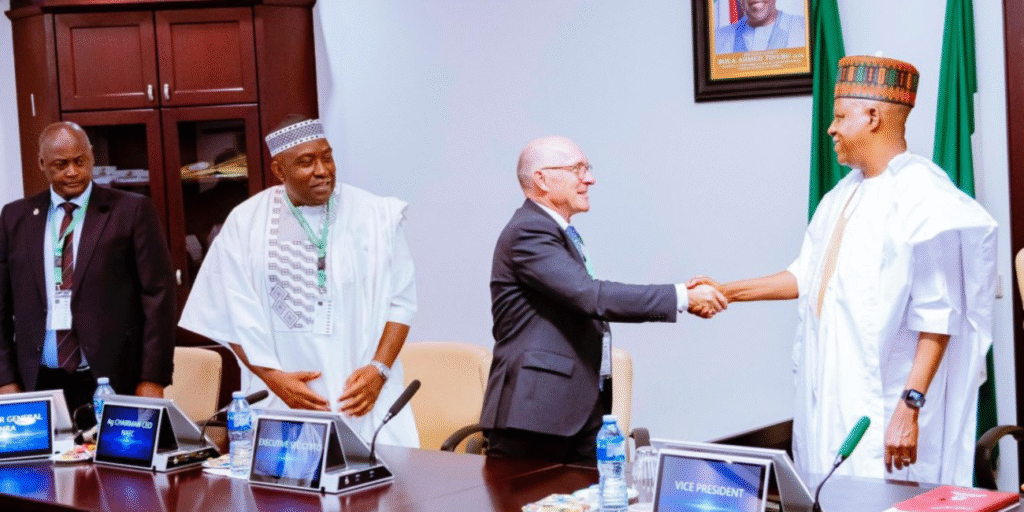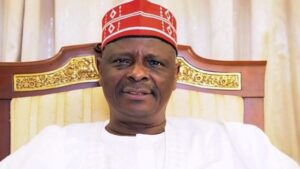
The Federal Government of Nigeria has reiterated its firm stance against the development or use of nuclear weapons, affirming that its primary battle lies in combating poverty and addressing the pressing ecological challenges confronting the African continent.
Vice President Kashim Shettima made the declaration on Monday during a courtesy visit by the Executive Secretary of the Comprehensive Nuclear-Test-Ban Treaty Organisation (CTBTO), Dr Robert Floyd, to the Presidential Villa in Abuja.
In a statement shared via the official X handle of the Nigerian Presidency, Shettima reaffirmed Nigeria’s commitment to the Comprehensive Nuclear-Test-Ban Treaty (CTBT), calling on the international community to shift its focus to existential threats facing developing nations.
“The outcome of any nuclear conflict is never favourable. We are not at war with other nations—we are at war with poverty. We are confronting the intersection of economic hardship and ecological crisis in sub-Saharan Africa,” Shettima stated.
“We have no business engaging in nuclear weapons development. I wish to reiterate Nigeria’s total commitment to the CTBT and commend the CTBTO for its vigilance, with 337 monitoring stations globally. It is commendable that all seven nuclear tests conducted by DPR Korea were detected.”
He also lauded the CTBTO’s global monitoring network, noting its dual role in supporting civil applications such as disaster prediction and mitigation.
“The value of CTBTO’s work extends beyond nuclear detection. Its systems also assist in identifying tsunamis, seismic and volcanic activity, all of which enhance our capacity to respond to natural disasters and stabilise our ecological systems,” he added.
In his response, Dr Robert Floyd praised Nigeria for consistently strengthening the international regime against nuclear testing. He commended the Tinubu administration’s firm commitment to peace and disarmament.
“Nigeria has remained a pivotal player in the global campaign against nuclear testing,” Dr Floyd said, highlighting the strategic roles played by national agencies such as the Nigerian Atomic Energy Commission (NAEC) and the Nigerian Nuclear Regulatory Authority (NNRA) in advancing international safety and environmental monitoring.
He further acknowledged that Nigeria’s data-sharing efforts have bolstered global mechanisms for tracking natural and anthropogenic threats to the ecosystem.
Engr. Anthony Ekedegwa, Acting Chairman of NAEC, also addressed the meeting, noting that the agency’s collaboration with the CTBTO has been instrumental in developing Nigeria’s nuclear capacity.
Likewise, Dr Yau Idris, Director-General of the NNRA, reaffirmed Nigeria’s compliance with international regulatory frameworks and treaties relating to nuclear testing.
Present at the high-level engagement were the Permanent Secretary, Ministry of Foreign Affairs, and the Ambassador. Dunoma Ahmed, CTBTO’s Senior External Relations Officer, Mr Charles Oko, and other senior officials from NAEC, NNRA, and the Foreign Affairs Ministry.
The meeting comes against the backdrop of heightened global concern over nuclear proliferation, with experts cautioning that renewed tensions could trigger catastrophic consequences, particularly for vulnerable regions already grappling with poverty and environmental degradation.


![[PHOTOS] Arewa Offa, Mustapha Amidat Concludes Skill Acquisition, Exhibition Programme](https://newsbulletin.com.ng/wp-content/uploads/2025/09/IMG-20250920-WA0011-300x300.jpg)




